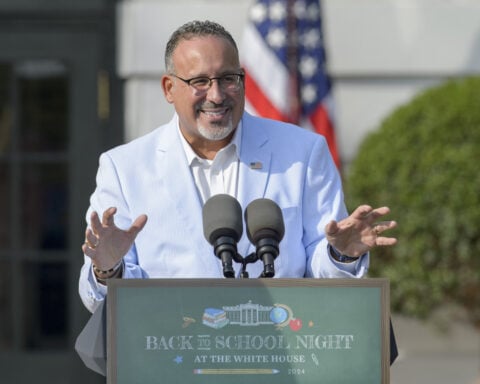About 1 out of every 100 students in American public schools has autism. A subset of these students also have academic gifts and talents in a broad range of areas, including math, science, technology, the humanities and the arts. These students are often referred to as “twice exceptional.”
To learn more about this population, we conducted research with three groups: twice-exceptional autistic college students, their parents and college staff who work with them. The students were all enrolled in or recent graduates of competitive and very competitive colleges, including Ivy League institutions. We identified several strategies that can help these students transition to and succeed in college.
1. Identify both autism and giftedness
Identifying twice-exceptional students can be difficult because their gifts may mask their disabilities. Conversely, their disabilities may mask their gifts.
One student stated, “My mother was told that I was too smart to have a disability, so I did not really believe that I had a disability.”
When these students are identified only as autistic, they may be placed in special education programs that focus on remediation of deficits, rather than encouraging students to develop and build upon their strengths. They might not be enrolled in challenging courses. On the other hand, when gifted autistic students are identified only as gifted, they might not receive the support needed to accommodate their disabilities.
The students in our research project discussed how important it was for both their academic success and self-confidence to be appropriately identified. One student stated: “I had an amazing teacher who gave me opportunities to participate in projects. One of my mentors was a science teacher, and she also gave me advanced opportunities. She gave me so many chances for advanced work. She let me apply science to the real world and to me; that was beautiful. She gave me the confidence to know that I could go beyond and do extra work.”
2. Take challenging courses
Nearly every student and parent stated that college attendance was an expectation from an early age. To prepare for this goal, students took challenging courses focused on their strengths.
For example, of the students we interviewed, nearly three-quarters were enrolled in Advanced Placement, honors or college credit-bearing courses while in high school.
3. Pursue extracurricular activities
Almost every student participated in at least one extracurricular activity, and some in multiple activities.
Many of the students assumed leadership roles. One parent discussed how her son tutored his peers in high school and was seen as a leader. “He was a role model there,” the parent told us. “He had a lot of friends, and people really looked up to him and respected him. … He built his self-esteem, which really made a big difference.”
Both the students and parents discussed the importance of these activities as ways to pursue areas of interest, gain leadership experiences and find peers with similar interests.
About half of the students participated in residential camp or program experiences while in high school. They described how these programs helped them prepare to live away from home during college. One student said such programs “really helped, as it helped my ability to communicate with others and helped me to understand how to explain what I need to explain to others.”
4. Be aware of factors in choosing a college
The students reported that they were active participants in selecting their college. Finding a school with a program or major of interest was their biggest consideration.
Slightly less than half of the students interviewed started at a smaller school, or a smaller regional campus, before transferring to their final college or university. These smaller schools were often closer to home, enabling students to adjust to college life before they moved to their final competitive college or university. One parent told us that the family looked at schools that they could reach in two hours or so. “And that is because in case he had a meltdown, I wanted him to be in an area where I could drive and calm him down,” the parent said.
5. Understand differences in laws and supports
Different laws exist at the high school and college level regarding disability supports. For example, special education services will not be provided in college. Students will not receive modified instruction or assessments and instead may be eligible for reasonable accommodations, such as extended test time.
Each of the groups we studied spoke about the importance of understanding these differences and what they mean for the student seeking supports in college. One college staff member stressed that high school students should receive accommodations, if needed, and not modifications. He also suggested students understand “what a college professor is going to expect from them and how … parents aren’t going to contact professors.”
Colleges may offer different amounts of support for disabled students. These can range from basic accommodations to specific programs that provide an individual professional to support students. Colleges cannot charge extra fees for accommodations, but they can charge students to participate in more extensive and individualized support programs. Therefore, the level of disability support that the college offered was also a common consideration.
6. Find supportive professionals
Having a go-to contact person – an adviser, counselor, teacher or faculty member – was essential, the parents and students told us. Such professionals may recognize the student’s talents, support their interests and nurture opportunities for their growth.
One student said: “There were so many people that believed in me and gave me advanced courses and advanced independent projects. They gave me time to write short stories. They let me explore my strengths and interests.”
7. Teach students to take initiative
It is important to teach students how to advocate for themselves while in high school. The students we spoke with learned how to take care of their emotional and physical health through diet, exercise, meditation, music or finding time alone to recharge and deal with stress. They were involved in a variety of clubs and extracurricular activities. They used these experiences to make friends with similar interests.
These students also learned how to request and use available campus supports and academic accommodations when needed. Many of the students stated that they wished they had more opportunities to develop these skills while in high school.
One college staff member summarized: “one of the key successful skill sets is self-advocacy and being able to recognize when things are not going well and being able to speak up and say, ‘I need help.’ And then taking that even a step further to say, ‘Not only do I need help, but here’s how I need help.’ So it’s that level of self-awareness and then being able to articulate those needs to the right people.”
Gifted autistic students have tremendous potential but too often do not have the opportunity to develop their talents. Nationwide, only 39% of autistic students who start college finish, compared with 64% of all students.
With high expectations, support for talent development from teachers and careful transition planning that takes a strength-based approach, gifted students with autism can succeed in competitive colleges.
Links to our research, instructional videos and other resources are available for free on our project website.
Joseph Madaus receives funding from the U.S. Department of Education, Javits Gifted and Talented Students Education Grant Program (Grant Number: S206A190023) and the Neag Foundation, Wyomissing, PA.
Nicholas Gelbar receives funding from the U.S. Department of Education, Javits Gifted and Talented Students Education Grant Program (Grant Number: S206A190023).
Sally Reis receives funding from the U.S. Department of Education, Javits Gifted and Talented Students Education Grant Program (Grant Number: S206A190023).
Source: The Conversation

 Goldman Sachs beats profit estimates as investment banking, trading fuel bumper quarter
Goldman Sachs beats profit estimates as investment banking, trading fuel bumper quarter
 Citigroup swings to profit on trading strength, surging deals
Citigroup swings to profit on trading strength, surging deals
 ECB to cut rates four more times by mid-year, say economists - Reuters poll
ECB to cut rates four more times by mid-year, say economists - Reuters poll
 Moldova's separatist enclave hopes Russia will resume gas supplies soon
Moldova's separatist enclave hopes Russia will resume gas supplies soon
 China gives a wary welcome to influx of 'TikTok refugees' on RedNote
China gives a wary welcome to influx of 'TikTok refugees' on RedNote
 Look of the Week: Timothée Chalamet adopts London’s most stylish accessory
Look of the Week: Timothée Chalamet adopts London’s most stylish accessory
 Texas online porn age-verification law goes to US Supreme Court
Texas online porn age-verification law goes to US Supreme Court
 Overtourism was the buzzword of 2024. This summer looks to be just as crowded and chaotic
Overtourism was the buzzword of 2024. This summer looks to be just as crowded and chaotic
 Only 39% of autistic students who start college finish.
Only 39% of autistic students who start college finish.







